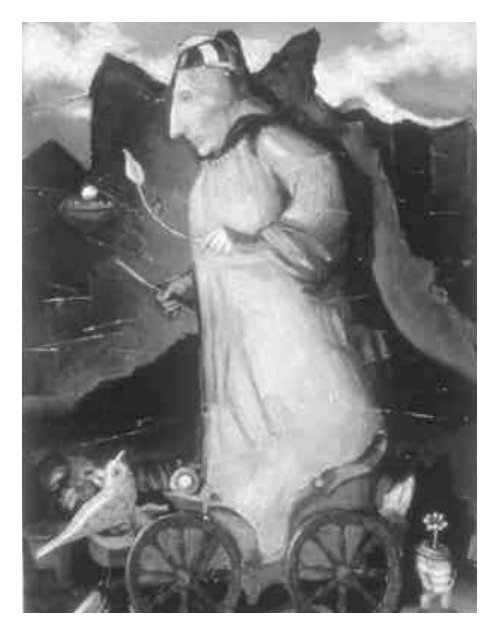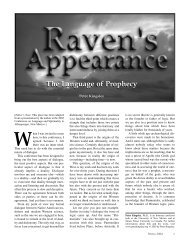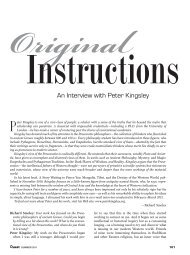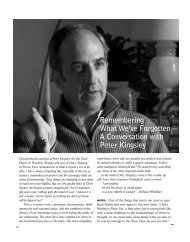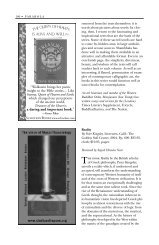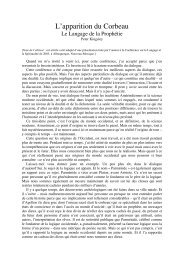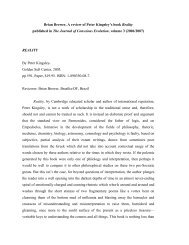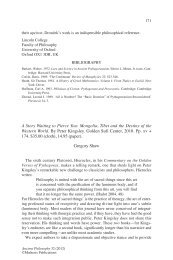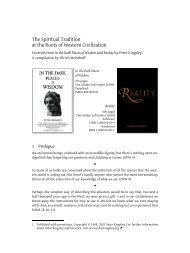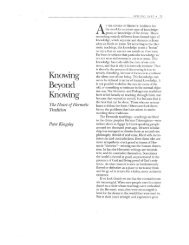Peter Kingsley
Peter Kingsley
Peter Kingsley
Create successful ePaper yourself
Turn your PDF publications into a flip-book with our unique Google optimized e-Paper software.
P E T E R K I N G S L E Y<br />
and the<br />
D i s c o m f o rt of<br />
Wi s d o m<br />
J e ff Munnis<br />
“What I have to say is in Reality. This is my life’s work, I<br />
have put everything I am into it. This is it: end of story.”<br />
—<strong>Peter</strong> <strong>Kingsley</strong><br />
Ifirst listened to <strong>Peter</strong> <strong>Kingsley</strong> speak at the<br />
Association for the Study of Dreams Conference<br />
in Berkeley in late June 2003. My interest in<br />
d reams is personal, not professional, but<br />
through my wife’s professional relationships and<br />
some friends I was given a pass to attend the<br />
conference. Unfortunately, the introduction to<br />
the keynote address became a monologue, repeating<br />
information contained in the conference schedule, so I<br />
stopped listening and watched the audience. I did not<br />
direct my attention to Dr. <strong>Kingsley</strong> until the applause following<br />
the introduction had faded. He chose to sit in a<br />
chair next to a table on the stage rather than stand behind<br />
a podium. There was a long silence before Dr. <strong>Kingsley</strong><br />
spoke, but this was not the result of some technical difficulty,<br />
or the fidgeting of a person preparing to speak. He<br />
looked at the audience very carefully, his eyes took in the<br />
LEFT: Michael Madzo, The dream of my life (2001). Sewn<br />
painted paper, 21 x 14 inches.<br />
room and I could<br />
feel the strength of<br />
his attempt to connect<br />
with every one.<br />
His first words were<br />
m e a s u red, care f u l l y<br />
spoken, and he left the audience space in his talk for the<br />
ideas to settle in. I found the ideas fascinating, but I was<br />
equally interested in his delivery and his willingness to<br />
present the audience with long periods of silence. Dr.<br />
<strong>Kingsley</strong>’s equanimity during the question and answer<br />
period made me as curious about him as about his subject.<br />
He was not detached, he was engaged, engaged in opening<br />
up the audience to the wisdom of Parmenides and<br />
Empedocles and he had offered his own experience with<br />
dreams as a point of entry.<br />
T h e re was polite applause after the presentation and<br />
questions, but I felt a ripple of discomfort underneath the<br />
response. Dr. <strong>Kingsley</strong>, in a very subtle way, had challenged<br />
the audience, a large group of psychologists, scholars and<br />
d ream workers, to engage the subject of dreams very deeply.<br />
P e rhaps, in a way that called out anyone bluffing their way<br />
t h rough the importance of dreams or the value of dre a m<br />
work. The tables had been turned on an audience that was<br />
used to preaching the value of their work to the rest of the<br />
world, and someone from the rest of the world just walked<br />
in and told them how he had integrated dream work and a<br />
p rocess called incubation into his life work. I felt very deeply<br />
that something significant had happened in the room and it<br />
was clear to me afterw a rds, that only a few people had<br />
understood Dr. <strong>Kingsley</strong>’s challenge. But, as you will read in<br />
the interview that follows, there has to be something special<br />
going on inside you in order to hear and understand these<br />
ideas. You have to be willing to let the words of Empedocles<br />
and Parmenides change you before you try to place your<br />
meaning in the word s .<br />
Ancient Philosophy, Mystery and Magic and In the Dark<br />
Places of Wisdom, Dr. <strong>Kingsley</strong>’s first two books, were sitting<br />
on tables outside the conference meeting room. I purchased<br />
both books and picked up a small brochure describing<br />
his new book, Reality. I read In the Dark Places of<br />
Wisdom, first, because Dr. <strong>Kingsley</strong> explained in his talk<br />
how he received the first chapter of the book from a<br />
dream. Next, I tackled Ancient Philosophy, Mystery and<br />
Magic. Both books are fully annotated and show considerable<br />
scholarly research supporting Dr. <strong>Kingsley</strong>’s ideas on<br />
how the teachings of Empedocles and Parmenides had<br />
been distorted and misunderstood. It started with Plato,<br />
along with some misre p resentation by Aristotle and<br />
Theophrastus, and a long line of philosophers and scholars<br />
perpetuated the charade right down to the present day.<br />
The ideas, as well as the implication of those ideas, resonated<br />
with me for quite some time as well as stimulating<br />
my curiosity about certain details of the books I held in my<br />
hands. Oxford University Press in Oxford, England, published<br />
Ancient Philosophy Mystery and Magic; Golden Sufi<br />
Center Publishing, Inverness, California, published In the<br />
Dark Places of Wisdom. I called Golden Sufi Center to<br />
request a pre-publication copy of Reality and to arrange<br />
an interview with Dr. <strong>Kingsley</strong>.<br />
Winter/Spring No.1<br />
Black Zinnias
D r. <strong>Kingsley</strong>’s ideas are penetrating on two levels. First, he<br />
cuts a wide swath through the scholarship on Empedocles,<br />
P a rmenides, and the Pythagorean tradition. He upsets commonly<br />
held ideas, challenges us to re-examine the role of<br />
reasoning and logic that came out of Athens and basically<br />
tells us that scholars and philosophers totally missed the<br />
point of these early teachings; the same teachings many consider<br />
to be the foundation of We s t e rn intellectual history. I<br />
have looked at some of the reviews of Dr. <strong>Kingsley</strong>’s work<br />
and I can sense the uncomfortable understanding that his<br />
work re n d e red unreliable volumes of scholarship on the<br />
ancient world of the Mediterranean. Second, in R e a l i t y, Dr.<br />
K i n g s l e y ’s ideas are presented from a personal perspective<br />
that shows his willingness and commitment to listen care f u l-<br />
ly and allow himself to be transformed by the poetry and<br />
teachings of Parmenides and Empedocles. It is also clear that<br />
his personal understanding, coming from the inside of both<br />
the academic world and from his own mystical experiences,<br />
challenges accepted academic standards. I interviewed Dr.<br />
K i n g s l e y, equally curious about both topics: the academic<br />
and the personal.<br />
We met in Inverness and talked for several hours in a<br />
house surrounded by trees, perched on the side of a hill. The<br />
v e ry quiet and peaceful setting matched Dr. <strong>Kingsley</strong>’s personality<br />
and mood. Some of the things we talked about<br />
reached a little deeper than his presentation at the Dre a m<br />
C o n f e rence in Berkeley. I felt fortunate that I could sit down<br />
with him and listen to him explain his ideas, ideas that could<br />
t u rn your understanding of the world upside down.<br />
Dr. <strong>Kingsley</strong> believes we only have an illusion of control<br />
in this world and that we go to great lengths to protect<br />
our perception of control. One of the reasons he believes<br />
dreams are so important is because we usually have no<br />
control over them. This idea of control also finds its way<br />
into his thoughts on the idea of having control over a spiritual<br />
practice: “A real spiritual practice will apply itself to<br />
you in ways that you have no idea of.” Wisdom is there for<br />
us if we are willing to do the work necessary to look and<br />
if we are willing to explore our own discomfort and travel<br />
into our own dark places.<br />
I started our conversation by saying to Dr. <strong>Kingsley</strong> that I<br />
felt he was a man in transition, perhaps transition from being<br />
a scholar to taking on a subject from a personal perspective.<br />
This is something someone asked me last week,<br />
a c t u a l l y, two people in the last couple of weeks. I<br />
seem to be an academic who is moving into a nonacademic<br />
field. That, I guess, is the general impre s-<br />
sion given by my biography—or at least by what<br />
can be gleaned from it . . . but it’s not really true.<br />
I found Dr. <strong>Kingsley</strong>’s manner, one on one, to be very<br />
close to the manner he embodied at the conference presentation.<br />
He paused, and I mentioned that I thought “personal”<br />
did not have to mean non-academic.<br />
Well, I think my work has become more and more<br />
non-academic in the last few years in the very particular<br />
sense that I don’t accept the academic norm<br />
of so called “objective” writing. I did that at first,<br />
but I threw it out the window in The Dark Places of<br />
Wi s d o mand even more so with the new book. Yo u<br />
k n o w, there are very specific criteria for writing an<br />
academic book or article. You have to maintain<br />
some kind of objective tone, an objective distance<br />
and not identify with what you are talking about.<br />
God forbid! I have a friend in Oxford, an extre m e-<br />
ly professional scholar, who once warned me that<br />
“the worst thing you can possibly do is to identify<br />
with the things you are writing about because that<br />
leads to insanity.” So, this is the modern academic<br />
m y t h — o b j e c t i v i t y. It’s something that has to be<br />
maintained, but is something that is totally an illu-<br />
Black Zinnias<br />
Winter/Spring No.1
sion. So, in that sense I no longer write academicall<br />
y. And I also make fun of scholarship. Not only do<br />
I not accept the norms of academia but I actually<br />
comment on them and critique them, especially in<br />
the latest book (R e a l i t y). So there are many people<br />
in academia who have been up in arms against me,<br />
because…well, this is the interesting thing. The<br />
first book was, after all, published by Oxford<br />
University Press, so they can’t simply dismiss it. They<br />
also know that I can handle the material either as<br />
well as or better than anyone else in the academic<br />
world. And this is the tricky thing, especially about<br />
the new book. It has extensive endnotes. And those<br />
endnotes, as scholars will probably realize, are so<br />
right up front in terms of breaking ground academically<br />
with re g a rd to the texts of Parm e n i d e s<br />
and Empedocles—making comments and drawing<br />
conclusions that have never been made or drawn<br />
b e f o re—that anyone who chose to ignore them<br />
and pretend they had not been written would be<br />
v e ry foolish. I planted these extremely scholarly<br />
and academic commentaries at the end of the<br />
book, which is totally unacademic. And I did that<br />
d e l i b e r a t e l y, so as to make the situation as unpalatable<br />
as possible. I want them to have to read this<br />
book. Although I did publish a long academic art i-<br />
cle to accompany the book, most of the real academic<br />
work has gone into the endnotes of the<br />
book itself and a lot of scholars are going to want<br />
to ignore that material because of what I say in the<br />
main part of the book. But they will do so at their<br />
peril! So is my work academic? It is, and it isn’t. I<br />
know that I can stand my ground with any academic<br />
who is willing to discuss the material with<br />
me. But a lot of academics are not going to want to<br />
do this because they know I am going to question<br />
their assumptions and that is something scholars<br />
themselves are never willing to do. They will question<br />
anything else, but they will never question<br />
their assumptions.<br />
During the question and answer portion of Dr. <strong>Kingsley</strong>’s<br />
talk at the Association for the Study of Dreams confere n c e ,<br />
members of the audience seemed particularly challenged by<br />
the idea that the use of reason had not led to any re a l<br />
p ro g ress for civilization. It was in this context that I wanted<br />
to continue. I commented that this led me to his ideas on<br />
how the use of reasoning has been based on an assumption<br />
and not many people go on to question the assumption.<br />
Yes. Absolutely yes. We will question anything<br />
except our questions. This is simply an acute form<br />
of myopia. I consider myself a true scholar because<br />
I will carry things right through to their logical and<br />
n e c e s s a ry conclusion. But that takes me into are a s<br />
that most scholars don’t want to go into. Why?<br />
Because the evidence doesn’t support their work,<br />
which is overwhelmingly limited and shaped by<br />
their assumptions. This is why I am very happy to<br />
stand up in debate with scholars on their own<br />
g round and discuss whatever details—however<br />
major or minor—they choose to consider.<br />
It became clear to me that the most important aspect of<br />
understanding Dr. <strong>Kingsley</strong> was his willingness to go to<br />
places that others were not willing to go. It was at this point<br />
LEFT: Michael Madzo, A long journey of promise (2002).<br />
Sewn painted paper, 16 x 22 inches.<br />
that I realized that this willingness is the most personal component<br />
of his work and it was also clear to me he believed it<br />
added to the depth of his work rather than detracting fro m<br />
it. I picked up the conversation by saying that now we have<br />
something that is more personal in the sense that the subject<br />
of R e a l i t yhas become your personal philosophy.<br />
Well, I feel I need to say something here about<br />
the idea of my being in transition, because on<br />
one level it’s true and on another level it’s not. I<br />
went through a phase of becoming a scholar in<br />
the acceptable sense, writing a book that was<br />
published by Oxford University Press and publishing<br />
a lot of academic articles. But that, for me,<br />
was just like what I describe in my newest book:<br />
it was actually a whole exercise in cunning. I was<br />
simply putting on a garment that didn’t belong<br />
to me, I had to wear it for a certain period of time<br />
and then I had to give it up.. In origin I am not a<br />
scholar, although I can play the scholarly game as<br />
well as anybody else. I am a mystic, and there was<br />
a time when I realized it was necessary—not just<br />
helpful but necessary—for me to get the academic<br />
credentials and so I did that. Then the time<br />
came when Oxford University Press wanted me to<br />
submit material for more books: after all Ancient<br />
Philosophy, Mystery and Magic did very well for<br />
them and was a phenomenal success. I knew people<br />
who had published with Oxford University<br />
Press all their life and it’s a great honor to be<br />
published by them. But that wasn’t where I was<br />
going and I had already done what needed to be<br />
done. And in fact then I had a dream which is one<br />
of those kinds of dreams that you cannot ignore,<br />
or I cannot ignore. Quite literally, I had the first<br />
chapter of In the Dark Places of Wisdom dictated<br />
to me in the dream. That was it! And from then<br />
on I find myself stepping further and further<br />
beyond the academic world, although I was<br />
never really at home in it.<br />
At the end of Ancient Philosophy, Mystery and Magic is<br />
a chapter describing some of the links between<br />
Empedocles, alchemy, Islam and Sufism. In the back of my<br />
mind I had been thinking of Golden Sufi Center Publishing<br />
and their catalog of books. The strongest link between Dr.<br />
<strong>Kingsley</strong>’s book and his publisher is the subject of mysticism,<br />
but there were clear links to Sufism as well. I brought<br />
this up by mentioning that I noticed the link to what Sufis<br />
describe when they say that in order to know something,<br />
to know something about God, you have to commit to<br />
God, otherwise you miss some of the crucial understanding<br />
that the purely objective observer will never know.<br />
A b s o l u t e l y, that has always been fundamental<br />
to me. Ever since I was a little boy I would have<br />
to see for myself. I went around never satisfied,<br />
even when I was seven years old. I caused a lot<br />
of trouble in my neighborhood, I was asking<br />
questions like “What is love?” and I was told,<br />
“Love is being nice to other people.” Then you<br />
ask them to go a little furt h e r, but nobody<br />
would do that. So I would ask and ask and ask<br />
and ask and there was only one person in the<br />
n e i g h b o rhood who would listen to me: he was<br />
a mathematician who lived next door, and he<br />
was wonderful. He would just sit me down and<br />
say “Ask your questions, I don’t have the<br />
answers but at least I can listen to your questions.”<br />
And I began to know as a child, I began<br />
to see when someone gives you an answer that<br />
comes from above their neck. It’s not a re a l<br />
a n s w e r, it’s not a full answer. It comes from the<br />
mind, not from the heart, and that was something<br />
I always had craved for.<br />
I felt a shift at this point in our conversation. The memories<br />
of childhood seemed to be so closely linked to Dr.<br />
<strong>Kingsley</strong>’s own understanding of how he worked and why<br />
he worked with so much attention to detail. I asked, What<br />
about the practice of stillness and dream work described in<br />
your books? Here is this tradition, this ritual that lasts from<br />
hours to days. Have you actually done that?<br />
Yes, not in a cave but in a room.<br />
The answers in this part of the interview were interesting<br />
because the moments of silence in our conversation<br />
felt like they expanded. The pace was casual, but still very<br />
serious. And I asked about his practice of incubation.<br />
It is something that I am drawn to naturally.<br />
I interpreted his approach to the unconscious as a “before ”<br />
f o rm of guidance rather than an “after” form of guidance,<br />
that is, going to the unconscious with a question rather than<br />
responding to the unconscious prodding us to look at something<br />
that comes from a dream. He explained his own pro c e s s .<br />
Sometimes it has happened with my wife, or with<br />
me, that we are in a particular situation where<br />
we are unsure about something: unsure about<br />
what to do. In such a case it’s ok, before going to<br />
bed, just to ask. And then sometimes it happens<br />
that you are given a dream. I remember once<br />
something very striking that happened to me<br />
when I was scheduled to teach in China for a year.<br />
Everything was ready, I had my visa, but something<br />
kept bothering me and I asked: what is<br />
this? And I had the most amazing dream, incredibly<br />
vivid, that told me in the greatest detail what<br />
would happen if I went to China: that it would literally<br />
be a torture. So even though this was the<br />
last moment and I was just about to leave, I sent<br />
the people who had invited me a telegram (this<br />
was what you did in those days) and of course<br />
they were very upset. But it was something I had<br />
to do. I trusted in the dream more than I trusted<br />
in what other people wanted or said.<br />
That was a case of asking for guidance, but generally<br />
I am wary about asking too much because this<br />
is to place a subtle imposition on our dreams. In<br />
N o rth America people often seem to have the idea<br />
that they should be able to use their dreams, cont<br />
rol them, plan dreams. This is quite alien to me<br />
because, as far as I am concerned, the dream is<br />
something quite sacred. I don’t want to condition it<br />
or place demands on it in any way.<br />
The dream is a mystical experience rather than a psychological<br />
adjustment.<br />
The worst thing we can do is try to make life fit in<br />
with our little expectations, because then we bring<br />
it down to our level rather than listening to it and<br />
l e a rning from it. If I’m going to listen to a dream I<br />
c a n ’t be telling it what I want to hear from it. It was<br />
Winter/Spring No.1<br />
Black Zinnias
quite a shock when I first came across the idea here<br />
in America of trying to control one’s dreams. There<br />
a re very, very esoteric practices in Tibetan Buddhism<br />
and in certain other traditions as well which allow<br />
you to go consciously into the dream state and cont<br />
rol what happens there. But that has to be done<br />
after an enormous training and also has to be done<br />
with a real absence of ego. If you go in with the<br />
usual sense of ego, you will cause so much harm<br />
because the ego becomes immensely powerful. That<br />
is why traditionally these esoteric practices are only<br />
kept for initiates who have had their ego worn away<br />
year after year because then, when they do a practice<br />
like that, there is a selflessness and they won’t<br />
do it for their own self-aggrandizement.<br />
So I hesitate to ask. You know, one thing that<br />
keeps on coming up for me is the whole question<br />
of question and answer. We don’t really look at<br />
all at what’s involved in this, because we live in a<br />
question and answer culture. We are totally<br />
taken in by the myth of dialectic—which in its<br />
present form goes back in the West to the time of<br />
Plato. This is the basis not just of television<br />
debates and quizzes but also of the whole of<br />
modern education, not to mention our strange<br />
legal system. We really believe in the power of<br />
question and answer, and this is one belief that<br />
will some day need to be questioned. Usually,<br />
99% of the time, when people ask a question<br />
they have energetically and quite unconsciously<br />
embedded in the question the answer they want<br />
to get. Just put a question mark at the end of a<br />
sentence and something very powerful happens.<br />
It can become a violation. Actually a lot of questions<br />
are almost like a rape. But to know how to<br />
ask a conscious question means, first of all, learning<br />
how to give up. Then we can ask the question<br />
and be totally open, with no idea or wish or inclination<br />
to prejudge what the answer will be. The<br />
trouble is that we now rush into this apparently<br />
innocent question and answer business without<br />
ever getting the most basic training.<br />
I always understood meditation to be a way of withdrawing<br />
our projections from the world.<br />
Yes. And the danger with the question is actually<br />
the projection. It’s a very subtle expectation. If I<br />
want to ask for a dream or ask the unconscious<br />
even for guidance, it becomes extremely subtle, I<br />
have seen it in myself, and in others as well. It can<br />
be very, very dangerous to ask for guidance if you<br />
want help in a particular situation, because you<br />
will get help but it will probably be the help you<br />
were looking for. It is actually self-fulfilling and<br />
can become terribly confusing because the mind<br />
is so powerful. If you ask something of life, you<br />
will get what you ask for.<br />
You may cut off the possibility of getting something<br />
greater or more beneficial.<br />
E x a c t l y. And this, again, is why I find it is import a n t<br />
sometimes not to ask. But sometimes we do have<br />
to ask questions, and this is where it becomes very<br />
tricky because this whole existence is so tricky. If<br />
you want to have a vision of the Buddha, or Christ,<br />
you will. But, as many traditions tell us, such visions<br />
a re not truly real. When you are in a question and<br />
answer situation there is always a duality and so<br />
t h e re will always be room for deception.<br />
The presentation of Love and Strife in the book, Reality,<br />
suggests that we have idealized Love. From the apostle<br />
Paul in Corinthians, whether correct or not, to some of<br />
what we focus on in Rumi, Love tends to get looked at in<br />
a one-sided way. I pointed out that he describes in Reality<br />
how “with love, nothing is what it seems” and “love traps<br />
the soul while strife sets it free.”<br />
I go back to my childhood where I am running<br />
around asking the question, “What is love?” We<br />
have so many notions and ideas about love. We<br />
honestly think we know what love is. This is<br />
where the problem lies. You mention Rumi, and I<br />
find that very relevant because there is a book<br />
coming out soon called Me and Rumi. It’s about<br />
R u m i ’s relationship with Shams-i Tabriz, his<br />
teacher, and the great Sufi scholar Annemarie<br />
Schimmel wrote an introduction to the book<br />
before she died. What she basically said in it is<br />
that this book is going to stop us in our tracks<br />
because we have such an overpowering notion of<br />
Rumi as representing a sweet, soft, gorgeous love<br />
and here is his teacher who is totally crude and<br />
ruthless and rough; and it knocks all our ideas of<br />
Rumi’s sweet and sugary love out of the window.<br />
Rumi has become so popular—but what is this<br />
love that he talks about? We think we know<br />
what it is, but in my experience we just don’t.<br />
We have a sugar coated version of Christianity.<br />
Now we have a sugar coated version of Rumi. It’s<br />
very satisfying to the ego, but basically love is<br />
destruction and dissolving of the ego. This is<br />
something I find so interesting with Empedocles,<br />
because when he refers to what we ordinarily<br />
think of as love he calls it “what humans call<br />
love.” He doesn’t say “what we call love”, and<br />
that’s because he was able to separate himself<br />
f rom the human condition. So is love, for<br />
Empedocles, the same as love is for us? And is<br />
what we call love really love? We have the comfortable<br />
idea that if we carry our ordinary feelings<br />
of love far enough then everything will<br />
become expansive and wonderful. But even in a<br />
human relationship, as most people know, if you<br />
really deeply love someone it’s not sweet. It<br />
opens up doors which are quite terrifying.<br />
In order to let go of a person, to love a person and set<br />
them free is terrifying.<br />
Even below that, just to love a human being can<br />
be hell. People, if they are seriously in love, have<br />
to rush to a therapist and usually, just as with<br />
counseling for depression, the therapist will try<br />
to pull them out of the burning and heartbreak.<br />
But to me that is where the pearl is, right down<br />
there in the dark. That is where the treasure is.<br />
Carl Jung describes growing as moving toward tension.<br />
Sometimes the tension just pulls you apart.<br />
In the last chapter of Ancient Philosophy, Mystery<br />
and Magic you mention the connection between<br />
Empedocles and the Islamic traditions. Where do we<br />
see that today?<br />
Well, really what happened is that these ancient<br />
traditions came into Islam mainly through southern<br />
Egypt and through the alchemical traditions.<br />
They had a tremendous influence on the earlier<br />
period of Sufism, which was quickly covered over<br />
by a lot of formalization. This is not to say there<br />
was ever such a thing as a Church in Islam, which<br />
of course there was not; but as the terminology<br />
and practices adopted by Sufis became more and<br />
more formalized, the idea that anyone apart<br />
from Mohammed could have exerted an influence<br />
on the beginnings of Islam became more<br />
and more unthinkable. And so these influences<br />
were almost entirely covered over. The only real<br />
place where room has been allowed for<br />
Empedocles is in the traditions of Iran. Somehow<br />
Iran kept its tradition. A tremendous wealth of<br />
knowledge and understanding has been retained<br />
there that was forgotten elsewhere.<br />
You knew you were going against the grain at one<br />
point with your understanding of Empedocles. What was<br />
it like when you came to that understanding? Did you feel<br />
you were swimming against the tide?<br />
A b s o l u t e l y. But there is a very particular story<br />
about how I came in contact with Empedocles.<br />
Back in around 1973, I was forced into a situation<br />
by life—but it was actually by Empedocles—where<br />
it was him and me alone. This was just after I first<br />
came into contact with his teaching and I knew<br />
t h e re was something very strange going on<br />
between him and me. I was a twenty-year-old kid<br />
and I was stuck in a room, incapacitated: a forc e d<br />
f o rm of incubation. We have so many strange ideas<br />
about illness and health, very superficial ideas; and<br />
h e re I was forced into a situation of illness just so<br />
that I could understand Empedocles. It was the only<br />
way to hold me there: I had to be incapacitated so<br />
that something could happen. I was keeping a journal<br />
of all my thoughts, including every single<br />
thought about Empedocles, writing them down<br />
exactly as they came to me. Unfortunately I don’t<br />
have it anymore. But there was one point, I re m e m-<br />
ber it was about two-thirds of the way down the<br />
left side of the journal I was writing, when the<br />
question came to me which I immediately wro t e<br />
down: “Please God, show me what Empedocles<br />
really means.” And within the space of fifteen or<br />
twenty seconds at the most I had been shown the<br />
whole of Empedocles’ teaching. I saw with<br />
absolute, crystal clarity that it was totally the<br />
reverse of what everybody in over two thousand<br />
years has always assumed it was. Love does not fre e<br />
the soul—and Strife is not evil, as people automatically<br />
assume. In fact Strife is the power that fre e s<br />
the soul from the snares of Love. And even at the<br />
time I realized immediately that this was no small<br />
m a t t e r. This one inversion had the most extraord i-<br />
n a ry implications for our understanding of We s t e rn<br />
h i s t o ry and culture as a whole. And I knew at once<br />
that this was the answer to my prayer.<br />
I mentioned earlier on the subject of question and<br />
a n s w e r. Thirty years ago I asked a question and,<br />
ever since then, have suff e red from asking it. That<br />
Black Zinnias<br />
Winter/Spring No.1
LEFT: Michael Madzo, The coming of unknown pleasures<br />
(2000). Sewn painted paper, 22 x 12 inches.<br />
and the English translation there—and there was<br />
no correspondence between them. The translators<br />
were not translating Empedocles at all: they<br />
were translating what they vaguely thought and<br />
hoped he might have said. It was a big shock.<br />
With time, when I had returned to Europe, I<br />
eventually understood that something very<br />
strange was going on. I began to realize that in<br />
the last two hundred years each time a scholar<br />
translates Empedocles he might make a point of<br />
questioning some minor detail here or there but<br />
will basically just copy the earlier scholars’ translations.The<br />
result is totally bizarre. I give examples<br />
in my new book, like the one right at the<br />
beginning of the very special passage where<br />
Empedocles is talking about his words and<br />
describing how they need to be absorbed and<br />
taken in. Where he says “If you press my words<br />
down underneath your densely packed<br />
diaphragm” (referring to specific breathing practices),<br />
all scholars nowadays will translate him as<br />
saying “If you press my words into your crowded<br />
brain.” And this process, of crowding our already<br />
crowded brains even further, is of course something<br />
we are all only too familiar with. But it has<br />
nothing to do with what Empedocles is saying.<br />
It’s a very great mystery how people, however<br />
intelligent, will not see what is right in front of<br />
their eyes. There is absolutely no ambiguity in the<br />
Greek: Empedocles is saying “underneath,” not<br />
“into.” But because this is what scholars want<br />
him to say, that is what they will make him mean.<br />
Again, it’s completely self-fulfilling. All that most<br />
people can understand is their own densely<br />
packed brains, so that’s what they assume<br />
Empedocles must have wanted to say through his<br />
own words.<br />
I asked if other scholars were paying as much attention<br />
to the language. Were they missing the meaning because<br />
of not understanding the language?<br />
question completely changed my life. This is another<br />
reason why it’s so important to be careful with<br />
our questions. You need to be very careful when<br />
you ask a question like “Please God, show me . . .”,<br />
because if it’s answered you will pay for that<br />
answer with the rest of your life. We have no idea<br />
how powerful questions are. And this is because<br />
we have no idea how powerful words are .<br />
D r. <strong>Kingsley</strong>’s books offer rich detail to considerable<br />
depth on the language of Parmenides and Empedocles.<br />
It is one of the foundations of his work. I asked for<br />
his comments.<br />
Words are like the ground, the earth. There is a<br />
tremendous power in words, a very particular<br />
power that you ignore at your peril. I should try<br />
to tell, in the briefest outline, the story of how I<br />
came to Empedocles. It was like an accident. I<br />
missed a class in college, which was something<br />
very unusual for me, and because I missed that<br />
one class I was given Empedocles as the subject<br />
for a paper I would have to write over the break.<br />
The other kids teased me about it. I used to travel<br />
a lot in those days, so I took the original Greek<br />
text of Empedocles’ poetry and the most authoritative<br />
English translation I could find and hitchhiked<br />
down to Morocco. Afterwards I realized<br />
that I had done this quite instinctively and unconsciously<br />
because there was no way I could be<br />
introduced to Empedocles while I was a part of<br />
the collectiveness of Europe. There is an incredibly<br />
dense and protective cocoon surrounding<br />
Europe that we are not aware of and that actually<br />
limits our ability to reach beyond it.<br />
So I went down to Tangiers. In my hotel room or<br />
down on the beach I read the Greek text here<br />
It is much deeper than that. Empedocles and<br />
Parmenides were magicians. They knew how to<br />
work with energies we don’t even know exist.<br />
They knew the power of words. They were<br />
responsible for creating, laying the foundation<br />
for, most of this culture we now live in. The mind<br />
can’t understand that, but it is still fascinated by<br />
it and that is why people keep on writing books<br />
about Empedocles and Parmenides. They keep<br />
being drawn. But there is something in their<br />
teachings that the mind can’t understand and<br />
when the mind can’t understand something, and<br />
is fascinated by it, it becomes obsessed.<br />
They will try to rationalize the situation and say<br />
P a rmenides and Empedocles were just the primitive<br />
c h i l d ren of our culture. But they are not the childre n :<br />
we are. And where does this lead? Here is the basic<br />
issue I have come up against many, many times. For<br />
example, back in 1999 I gave a talk at UCLA and presented<br />
the archaeological discoveries that have to<br />
do with Parmenides which show that he was not just<br />
an abstract thinker: that there was much more<br />
Winter/Spring No.1<br />
Black Zinnias
g o d d a rd<br />
c o l l e g e<br />
M . F. A . i n<br />
c re a t i ve<br />
w r i t i n g<br />
p ro g ra m<br />
T he int e nsive weeklong re s ide nc y<br />
begins each semester at our<br />
l a ndmark Ve r mo nt campus and<br />
is followed by one - o n - o ne<br />
me nt o r i ng w i t ho u rd i s t i ng u i s he d<br />
fa c u l t y. Genres of f e re d :<br />
Po e t r y, F ic t io n ,C re a t i v e<br />
No n f ic t ion, Me mo i r, P l a y w r i t i ng ,<br />
S c re e nw r i t i ng ,a nd Cro s s - G e n re.<br />
OUR FAC U LT Y:<br />
Paul Selig (Pro g ram Dire c t o r ) ,<br />
Rebecca Brown, Jan Clausen,<br />
A l exa nder Che e, Ke n ny Frie s,<br />
Beatrix Gates, Elena Georg io u ,<br />
Neil Landau, Leslie Lee, Je a n ne<br />
Mackin, Nicola Mo r r i s, Ric h a rd<br />
Pa nek, Rachel Pollack, Ma r ia na<br />
R o mo - C a r mo na, Sarah Schu l ma n ,<br />
Martha Southgate, Julia na Spahr,<br />
D a rcey Steinke, Ja ne Wo h l<br />
RECENT VISITING WRITERS:<br />
J u l ia Alvarez, Russell Banks,<br />
Marilyn Chin, Christophe r<br />
D u ra ng, Doria n ne Laux,<br />
Ja mes Lecesne, Deena Me t z ge r,<br />
Dael Orlandersmith, Gra c e<br />
Pa l e y, David Rakoff, Stephe n<br />
Kuusisto, Jean Va l e nt i ne,<br />
Ja c q u e l i ne Wo o d s o n<br />
Call us & visit our we b s i t e.<br />
going on. I carefully explained how we know now<br />
c e rtain remarkable things as a result of those discoveries<br />
and how we can also work out a great deal by<br />
studying the fragments of Parmenides’ poetry that<br />
describe a journey into the underworld. The next<br />
day I was in the corridor of the classics depart m e n t<br />
and a teacher there said “Yo u ’ re too dogmatic. Yo u<br />
want us to believe that what you are saying is right.<br />
You should stop giving the appearance that you are<br />
right and other people are not. You and I are just the<br />
same, and your interpretation of Parmenides is no<br />
better than mine.” We were standing there in fro n t<br />
of the chair of the department and other faculty<br />
members, and I looked her straight in the eyes and<br />
said, “But you and I are not the same. You re a d<br />
P a rmenides so that you can change his meaning to<br />
suit yourself. I read Parmenides so that he can<br />
change me.” And that is the basic problem, because<br />
unless you read these people with the willingness to<br />
be changed you won’t change—ever. You will<br />
change them. You will make them into what they<br />
a re not. The change has to happen somewhere .<br />
T h e re is the power of change in their words. But<br />
people don’t want to be changed, and so you have<br />
to be very careful. Sometimes they literally “corre c t ”<br />
the Greek text. If they don’t like something, or feel<br />
u n c o m f o rtable about it, they will rationalize it and<br />
change it. It needs a certain commitment just to sit<br />
down in a room and say with humility: “I don’t have<br />
all the answers. And not only don’t I have all the<br />
answers but I don’t even have a single answer. I don’t<br />
have any answers and I need help.” And that’s the<br />
way in which I approached these people. I felt they<br />
mean more to me than I mean to myself. I was willing<br />
to become completely open and see what they<br />
had to say. No argument.<br />
I had a quote from Dr. <strong>Kingsley</strong>’s book that says the<br />
same thing, in a very concise way and I read it back to him.<br />
“The fragments of his (Empedocles) poem come together,<br />
not on a drawing board, or in a book, but in ourselves.”<br />
If we look at the material in this way we learn so<br />
much more.<br />
Again, I quoted a section from Dr. <strong>Kingsley</strong>’s book,<br />
“there is nothing quite as capable of changing a human<br />
being as the experience of utter changelessness.”<br />
Have you experienced this? Once you have, it’s<br />
something you can never forget or ignore.<br />
Finally, I asked if, from his perspective, people understood<br />
what he was trying to do.<br />
For the most part, yes. And I am amazed at how<br />
deep many people’s understanding goes. But I am<br />
also surprised at some of the comments I see. One<br />
reviewer stated that I must have included the<br />
“mystical” material in In the Dark Places of<br />
Wisdom because my publisher wanted it. Nothing<br />
could be further from the truth. It is important<br />
for me to publish what I feel is important. I don’t<br />
want my material to be edited or re-written. I<br />
have chosen to write the way I have written for a<br />
purpose. The first chapter of In the Dark Places of<br />
Wisdom was dictated to me in a dream: how can<br />
I change something that was given to me in that<br />
way? It would dishonor it; dishonor the process.<br />
Words have energy and we have to learn to<br />
respect that. Like music, words can have a certain<br />
effect when they come from a certain place.<br />
A vibration, like a note, a certain vibration.<br />
Yes. Yes. And I trust the process enough to let it<br />
be. It’s not a matter of practice; it is just a matter<br />
of letting it be what it is. •••<br />
RIGHT: Michael Madzo, All I ever feel (1998). Sewn painted<br />
paper, 13 x 11 inches.<br />
C o me t o G o dda rd a s<br />
y o u a re.L e a ve t he w a y<br />
y o u w a nt to b e.<br />
1-8 00-468 -488 8<br />
Black Zinnias<br />
Winter/Spring No.1


